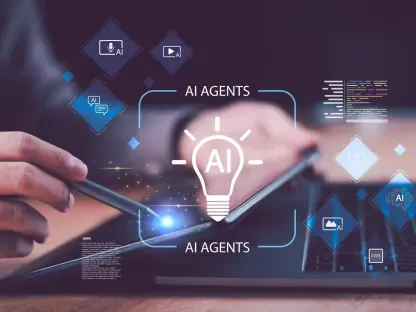The growing complexity and fast-paced environment of software development demand revolutionary solutions that are both effective and adaptive. Agentic coding tools, especially Claude Code, have emerged as a cornerstone in this technological advancement, significantly transforming the way programmers and non-programmers approach coding tasks. By effortlessly bridging the gap between technical prowess and creative solutions, Claude Code is redefining conventional paradigms in multiple industries. This review delves into the evolution, implications, and future prospects of agentic coding tools, particularly focusing on their impact at Anthropic.
Understanding Agentic Coding Tools
Agentic coding tools, such as Claude Code, have evolved to meet the demand for more intuitive and accessible development processes. Built on sophisticated AI algorithms, these tools are designed to enhance traditional coding methodologies by integrating AI-driven insights directly into code navigation, testing, and prototyping activities. Their emergence is strongly linked to the broader push for automation and intelligence in tech ecosystems, where the goal is not merely to aid programmers but to empower non-technical users to engage in software development more efficiently.
Within the larger technological framework, agentic tools have positioned themselves as crucial enablers of productivity and innovation. By offering capabilities that simplify complex processes and automate repetitive tasks, they have become invaluable across different sectors. The relevance of these tools extends beyond mere coding utilities; they are reshaping workplace dynamics and how diverse teams collaborate on tech-centric projects.
Key Features of Claude Code
Enhancing Codebase Exploration
One of the standout features of Claude Code is its codebase navigation and understanding capabilities. The tool excels in parsing vast amounts of code, simplifying the often cumbersome process of locating and understanding critical elements within a project. By highlighting dependencies and elucidating data pipelines, Claude Code enables rapid acclimation for new team members and enhances the efficiency of seasoned developers. This functionality is instrumental in reducing the ramp-up time typically associated with joining new projects or teams.
Streamlining Testing and Code Review
The automation of testing and code review is another area where Claude Code demonstrates considerable impact. Automating tasks traditionally seen as tedious and time-consuming, such as unit testing or code review, it significantly improves a team’s workflow. By utilizing tools like GitHub Actions, Claude Code manages to provide precise feedback and ensures adherence to coding standards, efficiently moving code from draft stages to fully vetted, production-ready states.
Powering Debugging and Prototyping
Debugging, a perennial challenge in software development, becomes less daunting with the diagnostic capabilities of Claude Code. By analyzing stack traces and system documentation, the tool aids developers in quickly identifying and rectifying issues, thus expediting problem resolution. Coupled with rapid prototyping features, Claude allows for swift idea iteration and testing, enabling teams to explore multiple solutions without the accompanying technical overhead that typically hinders innovation.
Knowledge Management and Workflow Optimization
Claude Code’s contribution extends beyond code development into the realm of documentation and knowledge management. By consolidating scattered technical documents into intuitive formats, it aids in the knowledge transfer process within teams and the creation of comprehensive runbooks. Additionally, the tool supports the creation of custom automation systems tailored to specific workflows, like marketing campaigns, reducing the reliance on extensive developer resources and demonstrating flexibility beyond standard coding tasks.
Innovations and Emerging Trends
The field of agentic coding tools continues to evolve, spurred by constant technological advancements and shifts in user expectations. One of the most exciting trends is the integration of natural language processing capabilities to further bridge the gap between human intent and machine execution. This integration allows users to articulate tasks in plain language, a step toward making coding accessible to all.
Another trend is the customization of agentic tools to cater to different industries. This has led to an increase in tailored solutions that address specific industry pain points, such as automating repetitive financial reporting or optimizing supply chain logistics. As these tools become more adaptive and specialized, their adoption rates are expected to grow exponentially, signaling a shift in how coding and automation are perceived and utilized.
Applications in Real-World Scenarios
Claude Code’s versatility lends itself to broad-scale application across various industries, positively impacting sectors from software engineering to legal services. For instance, in software engineering, it has expedited feature development cycles and fostered innovation through its rapid prototyping abilities. In legal departments, the tool aids in automating document review processes, allowing legal teams to focus on more critical thinking tasks.
Unique implementation cases include usage in creative fields, where Claude Code assists in turning creative concepts into executable digital experiences without extensive programming input. Its role in simplifying complex algorithms or generating imagery through code also underscores its adaptability across different professional landscapes.
Challenges and Limitations
Despite its broad applicability and potential, agentic coding tools face certain challenges that must be acknowledged for their continued evolution. Technical hurdles include the need for constant updates and improvements to keep up with dynamic coding environments and user demands. Additionally, while these tools attempt to democratize coding, there remains the potential for over-reliance, which may restrict deeper technical learning for users less familiar with programming.
Market adoption is another area where challenges persist, primarily due to regulatory concerns and resistance from traditional development practices. Efforts are underway to address these concerns, focusing on improving tool reliability and security to build trust and foster wider acceptance in more conservative sectors.
Looking Ahead: The Future of Agentic Coding
The trajectory for agentic coding tools is toward further integration into everyday business and life processes. As they continue to evolve, we can anticipate breakthroughs in artificial general intelligence features, where not only coding but comprehensive project management might be overseen by these tools. In parallel, increased collaboration between AI-driven tools and human creativity is likely to unlock new areas of innovation across industries, contributing to faster technological and conceptual advancements.
Eventually, these tools may redefine education within coding disciplines, nurturing a new generation of developers who are as comfortable with AI partnerships in coding as they are with traditional methods. This shift could accelerate technology-driven solutions’ development, further solidifying the importance of agentic coding in modern-day society and business practices.
A Comprehensive Conclusion
In summary, agentic coding tools like Claude Code have consistently proved to be transformative agents in the coding and tech domains. By driving efficiency and innovation across Anthropic’s teams, Claude Code has both complemented and elevated human capability. From simplifying complex problem-solving tasks to enabling rapid prototyping, its role in bridging expertise gaps is undeniable. The tool’s potential for even greater integration into diverse fields stresses the importance of continued development and adaptation, promoting a future where collaborative, intelligent tooling becomes a staple in technological and creative endeavors.









